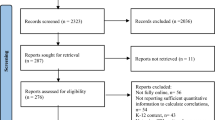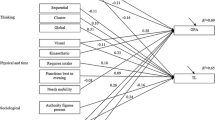Abstract
This study was aimed at clarifying relations between the way students learn and personal, contextual and performance variables. Students from seven different academic disciplines completed the Inventory of Learning Styles (ILS). Besides, data about their age, gender, academic discipline, prior education and exam performance were gathered. Regression and correlations analyses were used to analyse the data. The results showed that students’ learning patterns were indeed associated with personal and contextual factors such as academic discipline, prior education, age and gender, but that the different learning patterns had different sources. Second, students’ learning patterns proved to explain an important part of the variance in their academic performance. However, the results also revealed that exams as usually used in the first years of higher education hardly capitalise on students’ use of critical, analytical and concrete processing strategies.
Similar content being viewed by others
References
V.V. Busato F.J. Prins J.J. Elshout C. Hamaker (1998) ArticleTitleLearning styles: A cross-sectional and longitudinal study in higher education British Journal of Educational Psychology 68 427–441
V.V. Busato F.J. Prins J.J. Elshout C. Hamaker (1999) ArticleTitleThe relation between learning styles, the Big Five personality traits and achievement motivation in higher education Personality and Individual Differences 26 129–140
A.B. Boyle T. Duffy K. Dunleavy (2003) ArticleTitleLearning styles and academic outcome: the validity and utility of Vermunt’s Inventory of Learning Styles in a British higher education setting British Journal of Educational Psychology 73 263–290
D.J. Cunningham (1991) ArticleTitle‘Assessing constructions and constructing assessments: a dialogue’ Educational Technology 31 IssueID5 13–17
F.P.C.M. De Jong (1995) ArticleTitleProcess-oriented instruction: Some considerations European Journal of Psychology of Education 4 317–323
N. Entwistle V. McCune (2004) ArticleTitleThe conceptual bases of study strategy inventories Educational Psychology Review 16 IssueID4 325–345
Entwistle, N. (2000, December). Some aspects of the teaching–learning environment influencing approaches to studying. Paper presented at the first meeting of the Edinburgh-2000 Group, Edinburgh, UK.
N. Entwistle V. McCune J. Hounsell (2003) ‘Investigating ways of enhancing university teaching–learning environments: Measuring students’ approaches to studying and perceptions of teaching’ E. de Corte L. Verschaffel N. Entwistle J. van Merriënboer (Eds) Powerful Learning Environments: Unravelling Basic Components and Dimensions Pergamon Oxford 89–107
N. Entwistle V. McCune P. Walker (2001) ‘Conceptions, styles and approaches within higher education: analytical abstractions and everyday experience’ R.J. Sternberg L.F. Zhang (Eds) Perspectives on thinking, learning and cognitive styles Erlbaum Mahwah, NJ 103–136
E. Geisler-Brenstein R.R Schmeck J. Hetherington (1996) ArticleTitleAn individual difference perspective on student diversity Higher Education 31 73–96
D. Kolb R.E. Boyatzis C. Mainemelis (2001) ‘Experiential learning theory: previous research and new directions’ R.J. Sternberg L.F. Zhang (Eds) Perspectives on thinking, learning and cognitive styles Erlbaum Mahwah, NJ 227–247
S. Lindblom-Ylänne K. Lonka (1999) ArticleTitleIndividual ways of interacting with the learning environment–Are they related to study success? Learning and Instruction 9 1–18
S. Lindblom-Ylänne K. Lonka (2000) ArticleTitleDissonant study orchestrations of high-achieving university students European Journal of Psychology of Education 15 19–32 Occurrence Handle10.1007/BF03173164
Lonka, K., Heikkilä, A., Lindblom-Ylänne, S. and Maury, S. (1997, August). Are epistemologies related to study activities in an innovative course? Paper presented at the 7th Conference of the European Association for Research on Leaning and Instruction, Athens, Greece.
K. Lonka E. Olkinuora J. Mäkinen (2004) ArticleTitleAspects and prospects of measuring studying and learning in higher education Educational Psychology Review 16 IssueID4 301–323
F. Marton R Säljö (1997) ‘Approaches to learning’ F. Marton D. Hounsell N. Entwistle (Eds) The Experience of Learning EditionNumber2 Scottish Academic Press Edinburgh 39–58
J.H.F. Meyer (2000) ArticleTitleThe modeling of ‘dissonant’ study orchestration in higher education European Journal of Psychology of Education 15 5–18 Occurrence Handle10.1007/BF03173163
J.H.F. Meyer P. Parsons T.T. Dunne (1990) ArticleTitleIndividual study orchestrations and their association with learning outcomes Higher Education 20 67–89
P. Ramsden (1988) ‘Context and strategy: situational influences on learning’ R.R. Schmeck (Eds) Learning strategies and learning styles Plenum Press New York 159–184
J.T.E. Richardson (2000) Researching student learning SRHE and Open University Press Buckingham
J.T.E. Richardson A. Morgan A. Woodley (1999) ArticleTitleApproaches to studying in distance education Higher Education 37 23–55
Rozendaal, J.S., De Brabander, C.J. and Minnaert, A. (2001, August). Boundaries and dimensionality of epistemological beliefs. Paper presented at the 9th Conference of the European Association for Research on Leaning and Instruction, Fribourg, Switzerland.
S.E. Severiens G.T.M. Ten Dam (1997) ArticleTitleGender and gender identity differences in learning styles Educational Psychology 17 79–93
K. Trigwell M. Prosser (1991) ArticleTitleRelating approaches to study and quality of learning outcomes at the course level British Journal of Educational Psychology 61 265–275
K. Trigwell M. Prosser F. Waterhouse (1999) ArticleTitleRelations between teachers’ approaches to teaching and students’ approaches to learning Higher Education 37 57–70
S.W. VanderStoep P. Pintrich A. Fagerlin (1996) ArticleTitleDisciplinary differences in self-regulated learning in college students Contemporary Educational Psychology 21 345–362
Y.J. Vermetten H.G. Lodewijks J.D. Vermunt (2001) ArticleTitleThe role of personality traits and goal orientations in strategy use Contemporary Educational Psychology 26 149–170
J.D. Vermunt (1996) ArticleTitleMetacognitive, cognitive and affective aspects of learning styles and strategies: A phenomenographic analysis Higher Education 31 25–50
J.D. Vermunt (1998) ArticleTitleThe regulation of constructive learning processes British Journal of Educational Psychology 68 149–171
J.D. Vermunt (2003) ‘The power of learning environments and the quality of student learning , E. de Corte’ L. Verschaffel N. Entwistle J. van Merriënboer (Eds) Powerful Learning Environments: Unravelling Basic Components and Dimensions Pergamon Oxford 107–122
J.D. Vermunt N. Verloop (1999) ArticleTitleCongruence and friction between learning and teaching Learning and Instruction 9 257–280
L. Yan D. Kember (2004) ArticleTitleAvoider and engager approaches by out-of-class groups: the group equivalent to individual learning approaches Learning and Instruction 14 27–49
P. Zeegers (2001) ArticleTitleApproaches to learning in science: A longitudinal study British Journal of Educational Psychology 71 115–132
Author information
Authors and Affiliations
Corresponding author
Rights and permissions
About this article
Cite this article
Vermunt, J.D. Relations between student learning patterns and personal and contextual factors and academic performance. High Educ 49, 205–234 (2005). https://doi.org/10.1007/s10734-004-6664-2
Issue Date:
DOI: https://doi.org/10.1007/s10734-004-6664-2




